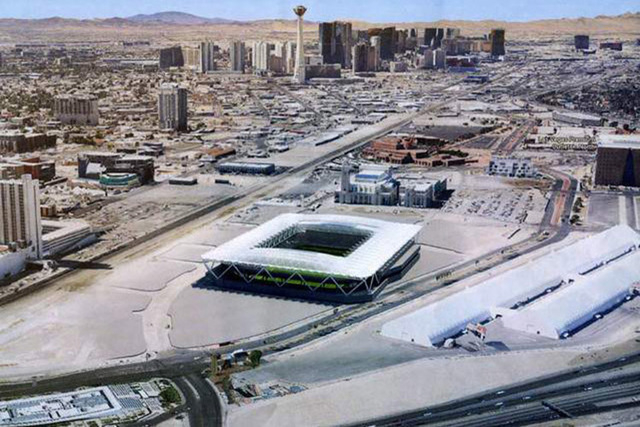Las Vegas council’s job is not to lead cheers
The dog-and-pony show is over. The re-finalized final deal is finally final.
The Las Vegas City Council is scheduled to vote Wednesday on whether to approve a new, improved financial term sheet offered by The Cordish Cos., and its local partner, Findlay Sports &Entertainment, to build a $200 million stadium at Symphony Park meant to provide a home field for a Major League Soccer franchise.
Cordish, headquartered in Baltimore, has held exclusive development rights on the real estate for more than four years. Until a few months ago, it appeared on its way to registering a goose egg at Symphony Park. Linking up with Findlay Sports with a plan to build a soccer stadium — not a basketball or hockey arena — must have arched the eyebrows of taxpayers throughout the city.
A soccer stadium? Not even Southern Nevada’s soccer fans had been clamoring for one.
But when you’re rejected by the NBA and benched by the NHL, you take what you can get — not that the MLS franchise is a guarantee for Las Vegas.
The viability issue is only one of the questions I still have about the city’s soccer obsession as the vote draws near.
Soccer backers in Sacramento, Calif., and Minneapolis, where the sport has a higher profile and a minor-league history, can draw from a larger resident fan base and would appear to have substantial advantages over the Las Vegas effort. Sacramento’s stadium plan, for instance, is privately funded.
Call it speculation, but don’t be surprised if Las Vegas one day is floated as a possible new home to the sorry Chivas USA MLS team, which plays poorly, is run worse, and draws the fewest fans in the league despite being located in the Los Angeles area. These days it’s without a permanent home field.
Under the previous final deal floated by Cordish and Findlay, the city would have borrowed $115 million and handed over $3 million a year in room tax dollars earmarked for parks maintenance and funding in exchange for $3.5 million in annual rent. The rent would be paid only if the developers turned a profit.
The new final deal involves the city borrowing up to $50 million, paying $14 million for infrastructure improvements, spending another $22 million with a special sales tax, and using the $3 million annual room tax fees to pay down the debt. The developers will come up with more upfront but pay no rent.
That somewhat improved position for the city was made possible only because Councilmen Bob Beers, Bob Coffin, Stavros Anthony and Lois Tarkanian were willing to vote against the embarrassing original giveaway. Beers, a certified public accountant, personally shredded the Cordish deal and was ridiculed for doing so by the stadium’s cheerleaders.
Beers, and to a lesser extent Coffin, have been portrayed by the stadium’s official and unofficial advocates as tone-deaf spoilsports who don’t get the vision and can’t hear the roar of the crowd. All those experienced former legislators did was read the pro forma spreadsheet as it existed. They also digested the rewrites, corrections and revisions following the developers’ epiphany that their offering wasn’t going to fly even with the popular Mayor Carolyn Goodman leading the cheer.
After the new deal surfaced, the Review-Journal reported cheerleader Councilman Ricki Barlow audaciously observing of the changes, “It’s negotiations. We’re still looking at the numbers.”
Trouble is, several members of the council didn’t appear to think twice about the numbers until the original deal was on its deathbed. Only then did the word “negotiation” escape their lips.
It surely makes some people wonder who they’re working for.
Cordish is a developer with a track record of success. This is a professional company, not a fly-by-night operator.
So why didn’t Cordish and Findlay embark earlier on a campaign to sell the stadium plan to the public?
Why didn’t they have a parking and traffic plan in hand weeks ago?
Why didn’t the developers, who figured to benefit so much from city approval, carve out a more respectable partnership with a municipal government just pulling itself out of a bruising recession?
The only conclusion I can draw is that they didn’t do those things because they didn’t think they needed to. They believed they had this bad deal wired from the start.
The lack of intellectual skepticism displayed by the city’s cheerleaders for this project is stunning. From the start Goodman made it clear that she wanted the stadium, in part to fulfill her husband’s legacy as the man who brought big league sports to Las Vegas.
That’s dandy, but what about cutting a reasonable deal for the taxpayers in the process?
The problem with this “negotiation” is that too few members of the council have been doing that. Instead, they’ve been cheerleaders, and that damages their credibility and taints their argument. They were elected to represent taxpayers, not an out-of-state developer that until the 11th hour hadn’t done its due diligence on a piece of real estate it has controlled for more than four years.
At last the dog-and-pony show is over. The vote approaches.
It’s easy to say those who voted for the downtown soccer stadium, should it founder, will be crippled politically. But that’s not so.
If this deal flops, by the time the true debts come due they’ll be out of office and, likely as not, onto bigger things.
City residents will be left with either the roar of the crowd or one more bill to pay.
John L. Smith’s column appears Sunday, Tuesday, Wednesday, Friday and Saturday. E-mail him at jsmith@reviewjournal.com or call 702-383-0295.






















